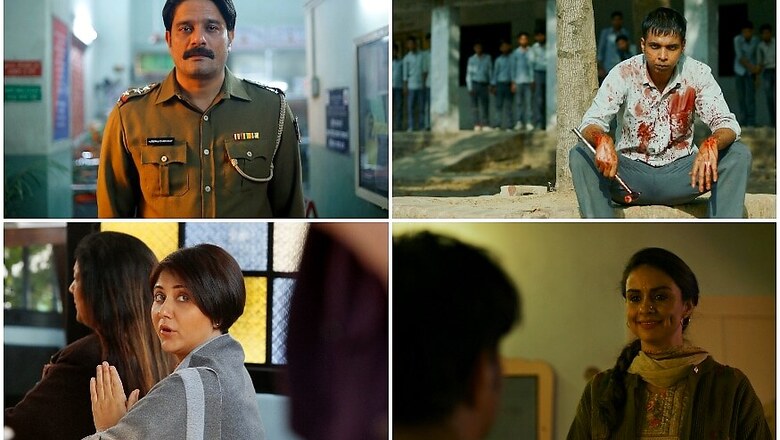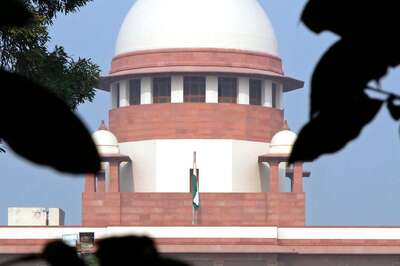
views
In a scene from Season 1 episode 6 of the recently released series Paatal Lok, journalist Sara Mathews is introduced to an intern who is assigned to her. Sara sniffs out the nepotism immediately and guesses that he is the son of a media big shot looking for some CV points before joining his father's company. "Delhi, you are so predictable," she says in exasperation.
That sentiment can extend to the whole of Paatal Lok as far as representing social issues and stereotypes is concerned. The moment Gul Panag's brother arrives at her home with a truck full of weird Chinese juice-dispensing machines, both her husband and the audience understand that he is planning to fleece his middle class sister.
(This article contains spoilers from the show.)
When Sara approaches her boss and disgruntled prime time journalist Sanjeev Mehra sitting alone at a bar, you know a workplace romance cum extramarital affair is brewing.
The show does manage to shock you as well, with the brutality in scenes of child sexual abuse and rape, but they are all part of a carefully crafted narrative that's ticking every box there is in making it a socially conscious show.
Mental health issues, caste discrimination, religious discrimination, economic divide, crime against women, gender issues, toxic masculinity, you name it. Every character represents an issue or a type, is oppressed by the system or society and struggling to break free.
*Economic divide: Swarg, narak, paatal - the show starts with the conventional labels of class divide that existed as concepts even before the caste divide came in. These are used as metaphors to explain the difference based on economy, and therefore geography, that exists in Delhi and in society at large.
*Islamophobia: Ishwak Singh's character Ansari, a young policeman, acts as a conscience call for every Hindu indulging in casual Islamophobia. Hathiram Chaudhary (Jaideep Ahlawat) uses a religious slur while interrogating a Muslim suspect, and later apologises to Ansari. A CBI officer, upon learning that Ansari has cleared UPSC prelims, marvels at how people from his community have "progressed". A Hindu woman on a train throws up on seeing her Muslim co-passenger eat non-veg food.
*Race and gender: The character of Mary Lyngdoh or Chini, a transgender woman from the northeast – represents two marginalised groups. While the character reminded actress Kubbra Sait of her own transgender role in Sacred Games, it has also been used to highlight the lack of facilities for trans men or women in lockups or jails.
*Suspended cop: There are more similarities to Sacred Games. Inspector Hathiram, much like Saif Ali Khan in the Netflix show, is suspended mid-investigation despite his sincerity. He is constantly being one-upped by his colleagues and juniors.
*Child abuse: The plight of street children is also highlighted, including a shocking brutal scene of child sexual abuse.
*Cast discrimination: Caste-based discriminatory practices prevalent in Punjab is shown through the character of Tope Singh, who is bullied and abused for protesting. His family is served with a harsh, sword-wielding reminder that their living in the village is a privilege, not a right.
*Crime against women: Rape is shown as an act of revenge in the male dominated world of both UP's Chitrakoot and a small village in Punjab. Instead of going to the police, rape victims are secretly married off and labeled as 'second hand' by their in-laws when they find out.
*Toxic masculinity: While Tope Singh is bullied at his village, Hathiram's son Siddharth is bullied at his elite school where he clearly does not belong. His classmates make fun of his father's name. On the other hand, teenagers around his own society taunt him for being 'English Medium and not tough like them. Siddharth struggles to find his space between two very different worlds.
*Hindi Medium: The post-colonial hangover not only affects the son, but also the father. Hathiram is unable to talk the principal of Wordsworth School into relaxing his son's punishment, when his English-speaking sidekick Ansari has to step in and impress with his fluency.
*Sympathetic Muslim sidekick: Hmmm, where have we seen this one? Oh yes, Sarfarosh. Remember Mukesh Rishi as Inspector Saleem, constantly proving his loyalty to his country?
*Mental health: The character of Dolly Mehra has been assigned the following – absentee and cheating husband, midlife crisis, anxiety issues, depression, craving for motherhood replaced by dog love, Buddhist chants for positivity, the works.
*Bengalis: Bong women call their dogs "Shabitri", put mustard oil in every dish and recite Rabindranath Tagore's poems to achieve a climax. Seriously?
Paatal Lok's plot stretches itself thin to accommodate so many clichés, which often take away from the intensity of the thriller.
What would have been a really woke show? A Muslim cop as protagonist with a Hindu sidekick. A mentally strong, financially independent wife who calls out her husband's infidelity instead of questioning her own age and attractiveness. A smart mother who knows exactly how to deal with her rogue teenage son instead of blaming her husband's daddy issues. A 'Jamna Paar' household without the usual disarray of DDA flats. We could go on, but you get the drift.
Follow @News18Movies for more




















Comments
0 comment